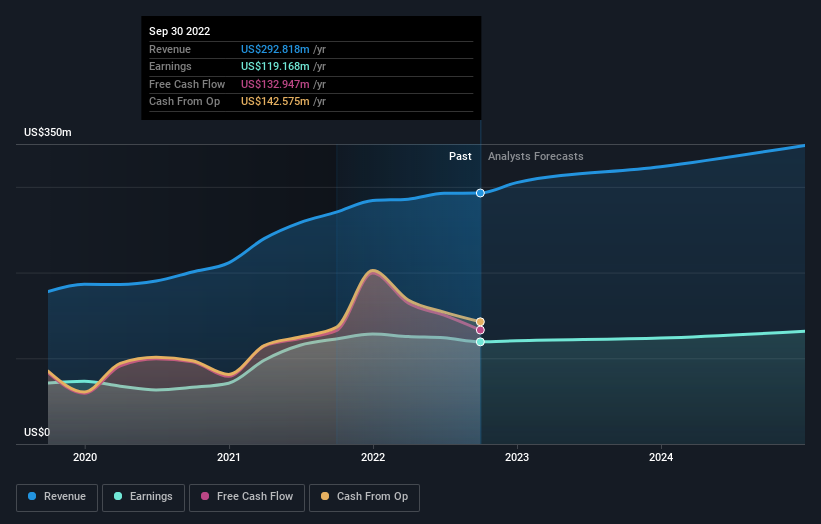ConnectOne Bancorp, Inc.'s (NASDAQ:CNOB) recent 5.9% pullback adds to one-year year losses, institutional owners may take drastic measures
To get a sense of who is truly in control of ConnectOne Bancorp, Inc. (NASDAQ:CNOB), it is important to understand the ownership structure of the business. And the group that holds the biggest piece of the pie are institutions with 69% ownership. In other words, the group stands to gain the most (or lose the most) from their investment into the company.
And institutional investors endured the highest losses after the company's share price fell by 5.9% last week. Needless to say, the recent loss which further adds to the one-year loss to shareholders of 25% might not go down well especially with this category of shareholders. Also referred to as "smart money", institutions have a lot of sway over how a stock's price moves. As a result, if the downtrend continues, institutions may face pressures to sell ConnectOne Bancorp, which might have negative implications on individual investors.
Let's delve deeper into each type of owner of ConnectOne Bancorp, beginning with the chart below.
View our latest analysis for ConnectOne Bancorp
What Does The Institutional Ownership Tell Us About ConnectOne Bancorp?
Institutions typically measure themselves against a benchmark when reporting to their own investors, so they often become more enthusiastic about a stock once it's included in a major index. We would expect most companies to have some institutions on the register, especially if they are growing.
As you can see, institutional investors have a fair amount of stake in ConnectOne Bancorp. This suggests some credibility amongst professional investors. But we can't rely on that fact alone since institutions make bad investments sometimes, just like everyone does. When multiple institutions own a stock, there's always a risk that they are in a 'crowded trade'. When such a trade goes wrong, multiple parties may compete to sell stock fast. This risk is higher in a company without a history of growth. You can see ConnectOne Bancorp's historic earnings and revenue below, but keep in mind there's always more to the story.
Since institutional investors own more than half the issued stock, the board will likely have to pay attention to their preferences. Hedge funds don't have many shares in ConnectOne Bancorp. BlackRock, Inc. is currently the largest shareholder, with 7.6% of shares outstanding. For context, the second largest shareholder holds about 6.5% of the shares outstanding, followed by an ownership of 4.8% by the third-largest shareholder. In addition, we found that Frank Sorrentino, the CEO has 2.0% of the shares allocated to their name.
After doing some more digging, we found that the top 19 have the combined ownership of 51% in the company, suggesting that no single shareholder has significant control over the company.
Researching institutional ownership is a good way to gauge and filter a stock's expected performance. The same can be achieved by studying analyst sentiments. Quite a few analysts cover the stock, so you could look into forecast growth quite easily.
Insider Ownership Of ConnectOne Bancorp
While the precise definition of an insider can be subjective, almost everyone considers board members to be insiders. The company management answer to the board and the latter should represent the interests of shareholders. Notably, sometimes top-level managers are on the board themselves.
Most consider insider ownership a positive because it can indicate the board is well aligned with other shareholders. However, on some occasions too much power is concentrated within this group.
It seems insiders own a significant proportion of ConnectOne Bancorp, Inc.. Insiders have a US$94m stake in this US$920m business. We would say this shows alignment with shareholders, but it is worth noting that the company is still quite small; some insiders may have founded the business. You can click here to see if those insiders have been buying or selling.
General Public Ownership
The general public-- including retail investors -- own 21% stake in the company, and hence can't easily be ignored. While this group can't necessarily call the shots, it can certainly have a real influence on how the company is run.
Next Steps:
I find it very interesting to look at who exactly owns a company. But to truly gain insight, we need to consider other information, too.
I like to dive deeper into how a company has performed in the past. You can find historic revenue and earnings in this detailed graph.
If you would prefer discover what analysts are predicting in terms of future growth, do not miss this free report on analyst forecasts.
NB: Figures in this article are calculated using data from the last twelve months, which refer to the 12-month period ending on the last date of the month the financial statement is dated. This may not be consistent with full year annual report figures.
Have feedback on this article? Concerned about the content? Get in touch with us directly. Alternatively, email editorial-team (at) simplywallst.com.
This article by Simply Wall St is general in nature. We provide commentary based on historical data and analyst forecasts only using an unbiased methodology and our articles are not intended to be financial advice. It does not constitute a recommendation to buy or sell any stock, and does not take account of your objectives, or your financial situation. We aim to bring you long-term focused analysis driven by fundamental data. Note that our analysis may not factor in the latest price-sensitive company announcements or qualitative material. Simply Wall St has no position in any stocks mentioned.
Join A Paid User Research Session
You’ll receive a US$30 Amazon Gift card for 1 hour of your time while helping us build better investing tools for the individual investors like yourself. Sign up here


